march-top.html
1772 On this day in 1772, the British government ordered a heavy military response to ‘crush’ the Steelboy disturbances in Ireland. The Steelboys (also known as the Hearts of Steel) were a group of Protestants (mainly Presbyterians) unhappy with the high rents they were charged by British landowners.
The group originated in County Armagh but soon spread. They adopted aggressive and violent tactics in order to achieve their goal of lower rents. The Steelboys used night raids; cattle would be maimed in order to leave them worthless, and landlords were threatened and attacked if they attempted to collect rent higher than the sum set by the Steelboys.
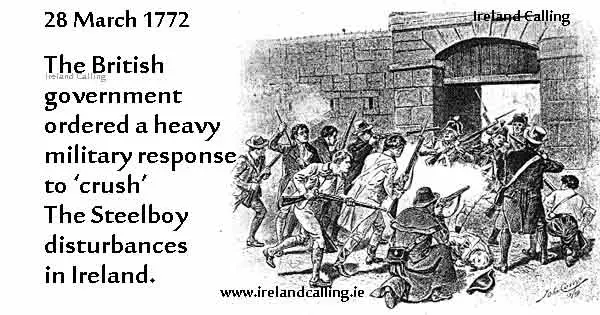 An attack on the castle of landowner Sir Richard Johnston was considered the final straw by the British. Johnston attempted to fly a flag of truce when faced by a crowd of hundreds of angry protestors. His plea was ignored and a gunfight followed with his soldiers desperately trying to defend him.
An attack on the castle of landowner Sir Richard Johnston was considered the final straw by the British. Johnston attempted to fly a flag of truce when faced by a crowd of hundreds of angry protestors. His plea was ignored and a gunfight followed with his soldiers desperately trying to defend him.
Johnston was forced to flee his castle in fear of his life, and swam the River Bann to safety. On his return he found his castle destroyed and requested military assistance from the government, with the intention of catching and killing the Steelboy ringleaders.
Click here to read more about life in Ireland under British rule
* * *
1879 Terence MacSwiney was born on this day, 28 March 1879 in Cork. He was a member Cork Irish Volunteers.
In April 1916, he was second in command of the Easter Rising in Cork. No rising took place in Cork because there were contradictory orders from the leadership of the Volunteers. Because MacSwiney was involved in the planning, he was deported from Ireland and interned in Bromyard internment camp. While in exile, he married Muriel Murphy in Bromyard, England. He was released in June 1917.
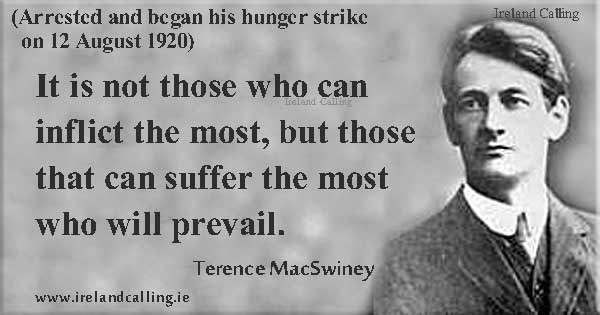
In 1918, MacSwiney became the Sinn Féin Mayor of Cork during the War of Independence. On 12 August 1920, MacSwiney was arrested and was charged with sedition – he had a cipher key to coded messages used by the Royal Irish Constabulary (RIC). He was tried on 16 August 1920 and sentenced to two years’ imprisonment in Brixton Prison.
He immediately went on hunger strike in protest at his internment, and because he had been tried by a military court . His treatment and hunger strike drew worldwide attention. North America threatened to boycott British goods. There were appeals to the Pope to intervene.
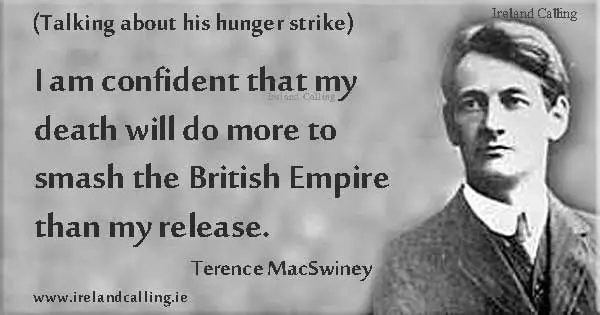
His jailers attemped to force-feed him, but after 74 days on hunger strike, MacSwiney died on 25 October 1920. His last words to a visiting priest were,
“I want you to bear witness that I die as a Soldier of the Irish Republic.”
He was buried in a grave next to Tomás MacCurtain in the Republican plot in Saint Finbarr’s Cemetery in Cork. Huge crowds watched the funeral procession on 31 October 1920.
The Funeral of Terence MacSwiney
Terence MacSwiney’s death strengthened the feeling against the British parliament. His influence went further than Ireland; Mahatma Gandhi and the Indian revolutionary Bhagat Singh were said to have been influenced by him. His book, Principles of Freedom, was translated into various Indian languages.
* * *
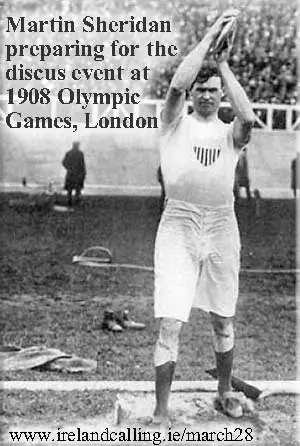 1881 Martin Sheridan was born in County Mayo on this day in 1881. He was 6’3″ and 194 lbs,and was the best all-around athlete and a five-time gold medallist.
1881 Martin Sheridan was born in County Mayo on this day in 1881. He was 6’3″ and 194 lbs,and was the best all-around athlete and a five-time gold medallist.
He moved to America as a child and represented the America in the 1904 St Louis and 1908 London Summer Olympic Games. He also competed in the 1906 Athens Games, which were considered to be a ‘second Olympics’ at the time, but are now not recognised as such by the official bodies.
In total, Sheridan won five gold medals across the three Games, in the Discus Throw, the Greek Discus and the Shot Put. He also won three silvers and a bronze in the Standing Jump and the Stone Throw.
The New York Times described him as “one of the greatest athletes the United States has ever known” after he died the day before his 37th birthday.
Sheridan was one of the first victims of the 1918 flu pandemic, which wiped out between 5 and 10% of the world’s population.
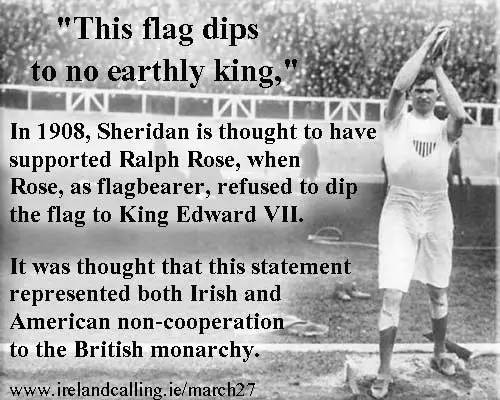
* * *
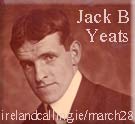 1957 Jack Butler Yeats died on this day in 1957. He was the son of painter John Butler Yeats, and the brother of Nobel Prize winning writer William Butler Yeats. However, Jack was a successful artist in his own right.
1957 Jack Butler Yeats died on this day in 1957. He was the son of painter John Butler Yeats, and the brother of Nobel Prize winning writer William Butler Yeats. However, Jack was a successful artist in his own right.
He illustrated several books for esteemed writers including Samuel Beckett and J M Synge. He also wrote and produced plays himself, but was more involved in theatre as a set artist and designer.
In 1999, one of Yeats’ paintings, The Wild Ones, sold at Sotheby’s auction house in London for £1.2m.
Yeats also holds the unexpected record of being Ireland’s first Olympic medallist. Two years after Ireland had been granted independence from British rule, Yeats was entered into the arts and culture competition at the 1924 Paris Summer Olympic Games. His painting, The Liffey Swim won a silver medal.
Click here to read more about Irish art.
Click here to read more about WB Yeats
Click here to read about John Millington Synge: Playboy of the Western World
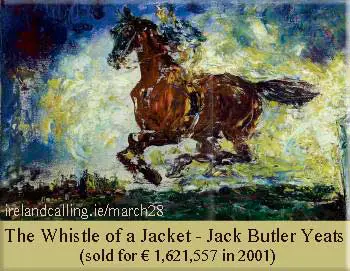
* * *
1961 Happy birthday to Orla Brady, born in County Wicklow on this day in 1961. She is a successful actress and though not a household name, she has appeared in several shows on US and UK television and is almost certainly a familiar face to many.
She played Naoise O’Niell in Family Law, Dr Jordan in Nip/Tuck, and Claire Stark in Shark on US screens. In the UK she has been the victim a con by the gang in Hustle, and had parts in Eternal Law, Sinbad and in the 2013 Christmas special of Doctor Who.
Click here to read about more great Irish actors
* * *
1976 Happy birthday Tim Millen, born in Portadown, Northern Ireland on this day in 1976. He is a professional racing driver and won the British GT Championship driving for Ferrari in 2006.
* * *
2003 Two tickets to the final game of this year’s Six Nations Championship were sold for €8,500. Ireland hosted England at Lansdowne Road, with both teams having won all of their previous four matches in the tournament.
That made the Lansdowne Road clash a winner-takes-all encounter, with the Six Nations Championship, the Triple Crown and the Grand Slam all up for grabs.
On this day in 2003, two days before the big game, one woman was willing to pay the hefty sum for the tickets at a charity auction on Irish television.
march-bottom.html